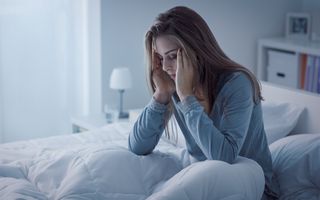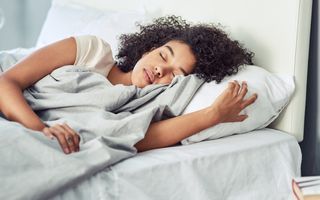Sleep Apnoea
Enjoy a restful sleep after a long day of commuting, working and other activities.

Most Australians enjoy a restful sleep after a long day. Unfortunately, some Australians suffer from sleep apnoea, and do not sleep as well.
What is Sleep Apnoea?
Sleep apnoea is a sleep disorder characterised by pauses in breathing or shallow breaths during sleep. These pauses can last for a few seconds up to a couple of minutes and may occur multiple times throughout the night. The most common type is obstructive sleep apnoea (OSA), where the throat muscles intermittently relax and block the airway. Another form of sleep apnoea is central sleep apnoea (CSA), which results from a failure of the brain to send appropriate signals to the muscles that control breathing.
Sleep apnoea can lead to fragmented sleep, daytime fatigue, and other health issues, making it important to seek diagnosis and appropriate treatment.

Risk factors for sleep apnoea
Any person can develop obstructive sleep apnoea, but several factors can place individuals into an increased risk category. These include:
- Excessive weight: Some people with obstructive sleep apnoea are overweight as fat deposits around the upper airway can obstruct their breathing. Medical conditions associated with obesity include hypothyroidism, polycystic ovary syndrome, and other conditions. Not everyone who is overweight will suffer from OSA, and thin people can also suffer from the disorder.
- Narrowed airway: You can inherit naturally narrow airways through your genes. Your tonsils or adenoids may become enlarged, which can block the airway.
- High blood pressure (hypertension): OSA is common in people who have hypertension.
- Chronic nasal congestion: OSA occurs twice as often in those who have consistent nasal congestion at night, regardless of the cause. Narrowed airways may cause this issue.
- Smoking: People who smoke are more likely to develop OSA.
- Diabetes: Obstructive sleep apnoea may be more common in individuals with diabetes.
- Sex: Men are twice as likely to develop OSA. The frequency of obstructive sleep apnoea also increases in women after menopause.
- Neck structure: People who have large or thick necks can also suffer from this condition.
Sleep apnoea symptoms
If you're not getting a good night's sleep, you may have sleep apnoea. Sleep apnoea can manifest through various symptoms, and these may vary in severity. Common signs and symptoms of sleep apnoea include:
- Loud snoring: Regular and loud snoring is a hallmark symptom, especially in obstructive sleep apnoea (OSA).
- Pauses in breathing: Witnessed interruptions in breathing during sleep, often reported by a sleep partner.
- Choking or gasping: Sudden awakenings accompanied by choking or gasping for breath.
- Excessive daytime sleepiness: Feeling excessively tired or fatigued during the day, even after a full night's sleep.
- Difficulty concentrating: Impaired concentration and difficulty staying alert during daily activities.
- Morning headaches: Waking up with frequent headaches, which may be a result of oxygen deprivation during sleep.
- Irritability: Increased irritability, mood swings, and a general change in mood.
- Difficulty sleeping: Insomnia or difficulty maintaining a continuous sleep pattern.
- Frequent urination: Needing to go to the bathroom frequently during the night.
- Dry mouth or sore throat: Waking up with a dry mouth or sore throat can be indicative of breathing through the mouth during sleep.
Sleep apnoea treatments
If you suffer from obstructive sleep apnoea, there are several possible treatments to help your condition. Some steps include:
- Weight loss: Losing ten per cent of your body weight can make a difference in sleep apnoea
- No alcohol or sedatives: Avoiding alcohol and sleeping pills help your airway close during sleep. It can keep you breathing for longer periods
- Sleeping on your side: This can help if you only have mild sleep apnoea when you sleep on your back
- Nasal sprays: These can treat sinus problems if nasal congestion makes it harder to breathe while you sleep

Many patients with sleep apnoea will require more treatment beyond these simple steps.
- Oral appliances: Do you have mild or moderate sleep apnoea? We can create a custom-made dental appliance, or "oral mandibular advancement" device. These appliances keep your tongue from blocking your airway as you sleep. Our experts can decide which ones may be right for your OSA.
- Mandibular Advancement Splint (MAS): Worn by patients as they sleep, this device helps the bottom jaw slightly protrude forwards in order to tighten certain muslces in the upper airway and allowing for more stable breathing throughout the night.
- Continuous Positive Airway Pressure (CPAP): These devices can include masks that you wear over your nose, mouth or both. An air blower forces constant air through your nose or mouth. The air pressure is just enough to keep your upper airway's tissues from relaxing too much while you sleep. A similar device is the BPAP which has two levels of airflow that change when you breathe in and out. CPAP machines are the most effective treatment for OSA, reducing daytime sleepiness and improving sleep quality. However, some people with OSA find the mask or feeling of pressure difficult to tolerate.
- Surgical Treatment: Doctors rarely use surgery to treat OSA. Some treatments include the uvulopalatopharyngoplasty (UPPP). This procedure removes some of the throat's soft tissues that collapse the airway during sleep. Although it's effective at reducing snoring, it doesn't always treat obstructive sleep apnoea.

OSA can also impact your health when left untreated. This health condition can lower the flow of oxygen to your organs and cause uneven heart rhythms. If you suffer from these symptoms, speak with your General Medical Practitioner.
Advantages of a sleep apnoea treatment
Receiving a sleep apnoea treatment can make a real difference in your life, from health to happiness.
- Better sleep: The key benefit of seeking OSA treatment is better sleep, so you will wake up feeling more refreshed and you won’t struggle with tiredness all day.
- Improved health: Sustained poor sleep can have negative health effects, from high blood pressure and an increased risk of hypertension, to depression and obesity.
- Non invasive: Using a mandibular advancement splint is a simple, non-invasive treatment, so you can enjoy the benefits of better sleep without medication or surgery.
What to expect from your sleep apnoea appointment
If your doctor has recommended seeing a dentist for a sleep mouthguard, here’s what you can expect from the process:
- Your dentist will perform an examination, and may take x-rays to assess your mouth and oral health
- Your dentist will take impressions of your teeth using a soft clay-like material that you will bite into
- These impressions will be sent to a lab that will make your custom sleep mouthguard
- It will take 2-3 weeks for the lab to make your sleep mouthguard and send it to your dentist
- You will return to your dentist to pick up the splint and ensure it fits well
- Your dentist will advise you on proper wear and care
- Be sure to bring your sleep mouthguard to your future dental check-ups so they can check how well it is wearing
If your general practitioner has advised you get a custom-made mandibular advancement splint, you will need to contact a dentist to have one made.
Get in touch with our friendly team today for more information.
Frequently asked questions
Obstructive Sleep Apnoea is when your airway partially or fully closes during sleep. This causes you to wake up regularly throughout the night, resulting in very poor sleep. Often, sufferers won’t even realise they have woken up numerous times throughout the night, but will wonder why they are so tired during the day, and may suffer headaches and other issues as a result.
For mild and moderate cases, medical practitioners may recommend a sleep mouthguard to help keep the airways open and restore restful sleep patterns.
Obstructive sleep apnoea can be cured through surgical intervention or by losing weight - or both - depending on your specific circumstances (not all those who suffer are overweight, for example).
In the meantime, it can be treated with devices such as a sleep mouthguard that can help to keep the airways open so you can enjoy a more restful sleep. This device tends to work best for those with mild to moderate cases.
Sleep apnoea, otherwise known as central sleep apnea, is when the brain doesn’t send the right signals to the muscles that control breathing. In the case of obstructive sleep apnoea, it’s more of a physical issue, as your airway becomes partially or completely blocked during sleep.
Obstructive sleep apnoea is the more common of the two.
The dangers of obstructive sleep apnoea in the short term is poor sleep, tiredness during the day, and headaches. Over time, the sustained lack of restful sleep can lead to an array of more serious health problems, such as high blood pressure, hypertension, depression, obesity, and strokes.
If left untreated, sleep apnoea can lead to a variety of health problems. These range from tiredness and moodiness, to depression and high blood pressure, to strokes and obesity.
That’s why it’s important to be wary of the signs of sleep apnoea, listen to your partner if they say you are exhibiting the symptoms, and seek medical attention. While it can take time for more serious symptoms to appear, sleep apnoea can be very disruptive to your alert levels and general happiness in the short term.

